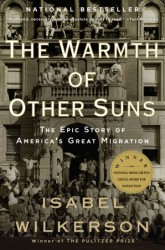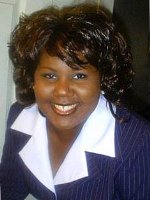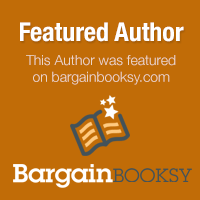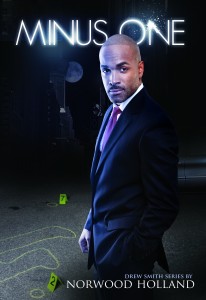The Warmth of Other Suns by Isabel Wilkerson
September 30, 2011

The Epic Story of America’s Great Migration is a testimony to the 20th Century African American struggle when the railroad to freedom was no longer underground but remaining for some a journey no less fraught with danger and resistance. Isabel Wilkerson painfully details the life stories of three migrants who escaped the oppression of the Jim Crow South. From 1915 to 1970 six million Blacks joined the exodus abandoning the confederate states for the promise of a better life elsewhere–most often northern industrial cities. It was a time of lynching, voter suppression, intimidation, systematic disenfranchisement, oppressive labor conditions and terrorism by lynching and bombings.
The title The Warmth of Other Suns is borrowed from Richard Wright’s quote
I was leaving the South to fling myself into the unknown. I was taking a part of the South to transplant in alien soil, to see if it could grow differently, if it could drink of new and cool rains, bend in strange winds, respond to the warmth of other suns, and, perhaps, to bloom. On a broad canvas Wilkerson paints a riveting and moving account of the racism and injustice faced by Blacks throughout the 20th Century and looking back one wonders what did Southern White America expect to gain from Jim Crowism. It ultimately hurt the South retarding its economic development.
Ida Mae Brandon Gladney, George Swanson Starling, and Robert Joseph Perching Foster, were from Mississippi, Florida, and Louisiana respectively. Ida Mae was a cotten picker, mother, sharecropper’s wife and later matriarch. Dr. Robert Joseph Perching Foster a graduate of Morehouse and Meharry escaped the boondocks and bayous to live out the high life he dreamed of but not without his own tales of woe discrimination and humiliation. George Swanson Starling a fruit picker whose labor organizing activities on behalf of blacks forced him to flee Florida with white vigilantes on his heels.
Wilkerson carries us through the life stories of the three sharing their hopes and dreams. We rejoice at their milestones and achievements, despair with their loss and challenges, and finally mourn their deaths. And what do we learn? According to one reviewer “if the Civil War was fought over black freedom, then it appeared during the decades following the war that the South won. Until World War I came along, that is. The Great War marked the beginning of one of the most important and under appreciated revolutions in American history.” We learn the stereotypes of Black Southerners invading northern cities corrupting communities was not so. They brought a strong work ethic, were at higher education level than northern Blacks and Whites, and overall maintained stable married households. If anything they were corrupted.
The Warmth of Others Suns is a scholarly study delivering a history lesson and told through the eyes and in the words of Americans discounted and devalued by white society throughout their lives. It’s a moral story we should never forget. Without such works like Wilkerson’s future generations may never know the full extent of the struggle suffered by those who came before us, and no doubt we stand on the shoulders of giants.
Seeking A Twitter Breakthrough
September 26, 2011
I’ve been waiting for a Twitter breakthrough when suddenly it all becomes crystal clear this Tweeting phenomenon. I opened a Twitter account three years ago. It lay fallow for the first two years. I would occasionally log in watch the Tweets and wonder why? The endless mundane comments surrounding the minutia of people’s ordinary uninteresting everyday lives all seemed like a waste of my time.
Obviously a generational thing as a Boomer the Millennial fad amounted to nothing more than nonsense. I had the same sentiments toward Facebook but that proved me wrong so I was willing to give it a chance. Facebook’s value revealed it power and purpose when I began to reconnect while my college pals and enjoyed the ability to correspond on a daily basis. Social Media had not impressed me until I attended a writer’s conference three years and heard the buzz about Social Media. It could help build your writer’s platform and your brand.
The Facebook breakthrough came early on. I soon launched a Kickstarter project to cover printing cost of my first novel. Facebook proved to be an incredible tool in attracting donors. Now the challenge becomes is to use Twitter to help develop a readership. Facebook offers greater advantages interacting with friends who have profiles and pictures aiding relationship building without the 140 character limitation. Twitter profiles are often vague, blank, or indistinct. You know very little about your followers.
I was befuddled as to how to build relationships and how Twitter would enhance my writer’s platform. Then about a year ago things began to change as I started to recognize relationships. I began to make a conscious effort and discovered the more time I was logged in, the more I observed and participated the more followers I attracted. The problem is finding your niche interest and followers with whom I had common interest. With a mere 200 followers I’m not there yet. I think its like swimming you just have to wade in and practice until you learn how to stay afloat.
I came to recognize the value of Twitter when it brought me face to face with a celebrity actor author whom I had admired and followed. Recently he tweeted he was doing a book signing at the Convention Center downtown. This was an opportunity I acted on immediately and came away thinking, wow, if only I could get people to come to my book signings on a moments notice that would be a breakthrough.
I have a twofold Twitter goal for the next year, (1) to build relationships with followers that will help promote my books, and (2) implement business and marketing strategies to get results. I will monitor my progress in terms of following and followers pursuing that breakthrough. Currently with 196 followers and 489 in a years time I hope to report the milestone and progress in pursuit of that breakthrough. Not only will I be staying afloat but doing laps.
The Colored Section of Bookstores
September 20, 2011

by Yolanda M. Johnson-Bryant the founder and CEO of Bryant Consulting. Her consulting firm provides a variety of services to new and established writers, including ghost writing, manuscript editing, character development, and marketing. See YolandaMJohnson.com
and LiteraryWonders.com
African-Americans have come a long way in the literary industry. More and more black authors are emerging onto the markets, be in via traditional publishing or self-publishing. This is good news to our authors and readers, but we have to admit—we have a long way to go.
As authors, we have made our mark in bookstores. Let me correct that—non African-American bookstores. Now, when a patron walks into a bookstore such as Borders, Barnes and Noble or even Wal-mart, a reader can find our section with ease; the “colored section” if you will.
No, this is not about race—not necessarily. This is more so about activism. Should our books have their own section in bookstores? Yes and no. A consumer should be able to walk into a bookstore and browse bookshelves by genre like they can any other book. By doing so, would close yet another notch in the belt of segregation.
However, the reality is that a lot of African-American authors would lose out if this was to happen; right now at least. Currently, when a reader learns of a new book by their favorite author, or a new author, it is so easy for them to head straight to the “colored section” to find the book they are looking for, and even then, there is no guarantee the book will be available.
Another frustrating factor of the “colored section” is the lack of variety of our books and the lack of quantity. Many bookstores may confine AA (African-American) books to one kiosk, or at best, a two-sided book shelf or corral. I often wonder how African-Americans would feel if this section was larger. Would we complain about the segregation of our books then? Perhaps so; but I get the feeling that there would be less complaints about the section, and more complaints about something else.
Could it be that African-Americans cringe at the thought of actually having to socialize amongst the proper folk and subject themselves to something outside of their comfort zone? This could be it, or perhaps another factor could be that we don’t want to take the time that it would take to saunter somewhere other than the “colored section” to find the book we are searching for. I’d say that all of the above might be true.
Earlier, I mentioned that this was not a matter of race but activism. Bookstores don’t get a free pass when it comes to the part they play in the “colored section” because they are guilty, guilty, guilty! Contemplate this: Just like we made our presence known in the literary industry, we can also make our presence known in bookstores and make our voices heard. Everywhere you look, there is a campaign for this or a campaign for that. Why not start a campaign to either make the “colored section” larger and with more variety or mixing our titles amongst the “house books” if you will.
Talk to your local bookstore managers and associates, write letters, start a Facebook page—something other than Like Me if You Like My Farmville Page. Let’s also hold publishers accountable for joining forces with authors and readers so we can do something about that little violation problem in bookstores. African-Americans will boycott a local restaurant because they didn’t have catfish on the menu, but won’t boycott a bookstore so that our books will have a better presence in their establishment.
By doing this, we challenge our readers to come in from the cotton fields and mingle in the country club, and at the same time, expanding our horizons. As African-Americans, we can no longer sit about and complain about things and do nothing about them. With the takeover of e-books and the closing of bookstores, our books will be diluted in the process. Take action or kindly put up your Baptist finger and excuse yourself.




